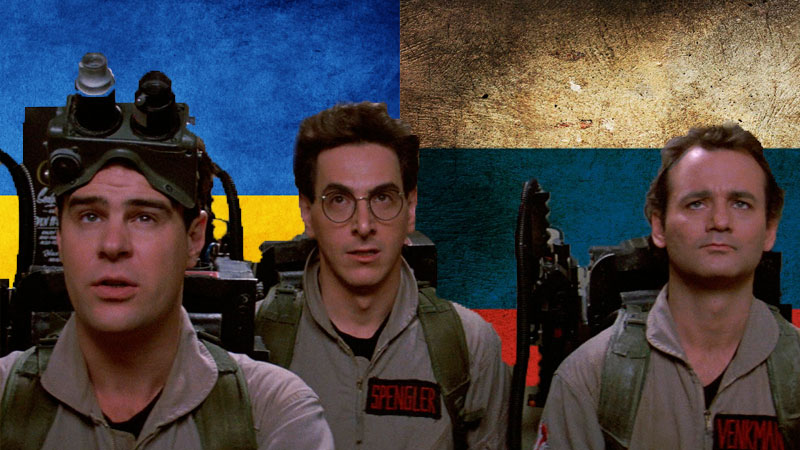
The online search for traces of Russian invaders and fascist nationalists continues in Eastern Ukraine. Images mixed by Kevin Rothrock.
An abandoned wallet is again at the center of a scandal in eastern Ukraine, where the army claims to have seized two Russian armored personnel carriers (APCs) near Luhansk. The Ukrainian government says it found a number of identifying materials inside: a pile of Russian driver’s licenses, a night club entrance card, credit cards, and other documents [1]. Kyiv has argued that the discovery provides the smoking gun proving Russia’s involvement in eastern Ukraine.
In April, the pro-Kremlin news network LifeNews ran a similar story, claiming that separatists discovered evidence of a right-wing group's involvement in an attack on a rebel outpost. The supposed proof was an artifact recovered from the site of a burned car: an intact business card belonging to Dmytro Yarosh, the Pravyi Sektor's leader.
The Russian media treated the business card as evidence that Ukrainian paramilitary groups were responsible for what was then the beginnings of Eastern Ukraine's bloodshed. The evidence was so flimsy that it immediately spawned a widely popular Internet meme [2]. The APC-document discovery hasn't produced the same explosion of memes as Yarosh's business card, probably because of the overabundance of news coming out of eastern Ukraine today. With lots of detective work, however, many online have tried to debunk (and others have tried to prove) Ukraine's assertion about the APCs. Indeed, crowdsourced efforts to identify military hardware are similar to the work done in Russia and the West to piece together what downed Malaysian Airlines Flight 17 [3].
As with the discovery of a business card at the scene of a gunfight, many on the RuNet find the unearthing of documents inside the captured APCs to be a little too convenient to believe. In the same vein, the Russian Defense Ministry has flatly denied [4] Ukraine's claim. One Russian Twitter user thought the evidence all too tidy:
@XS_71 [5] Десантники с паспортами, картами гламурных клубов и кредитками вместо военных билетов. Корана не хватает, да. pic.twitter.com/nYqfHzGeZV [6]
— Военные Фото (@RuPhotoMilitary) August 21, 2014 [7]
Paratroopers with their passports, cards for glamorous clubs, and credit cards instead of military IDs. All that’s missing is a Koran.
Russian user @XS_71 [5] (who runs the popular VVV-IG LiveJournal community blog [8]) has helped lead the charge in debunking Ukraine's claims. He says the documents found in the APC would not normally be found in such a location:
@KevinRothrock [9] “Журнал увольнительных” – хранится у дежурного по батальону, но ни в БМД, он не мог туда попасть
— XS (@XS_71) August 21, 2014 [10]
The “Military Leave Log” is kept with the battalion’s officer on duty—not in the APC. It could not have gotten there.
In another tweet, he claims that the APC seized by the Ukrainian military does not match the models used by the 76th Pskov Airborne Division:
БМД с номером 275 в 76й псковской дивизии есть. Только это БМД-4 (1фото), а не БМД-2(2 фото), которое показывают укры pic.twitter.com/wBZZdhg0Jb [11]
— XS (@XS_71) August 21, 2014 [12]
There is an APC with the number 275 in the 7th Pskov division. It’s just that this is a APC-4 (photo 1), and not the APC-2 (photo 2), which the dumb Ukrainians showed us.
On the other side of the conflict, social media users are also busy performing detective work to prove the authenticity of what the Ukrainian military says it's discovered. In English, as well, the anti-Kremlin website The Interpreter has compiled evidence [13] supporting Ukraine’s claim. Pro-Ukrainian Twitter user @forest_brother [14] worked as hard as @XS_71, but Forest has tried to identify the soldiers whose documents were left behind. Forest says he's managed to link one passport to a Russian soldier named Nikolai Krygin, who posted “100 dbh (days before home)” [15] on his VKontakte page, a day before the APCs were found in Ukraine.
http://t.co/fnfqMU9N8w [16] Один из экипажа захваченной БМД №275 Крыгин Николай, все. Срочник. #АТО [17] #Украина [18] #бмд [19] #Россия [20] pic.twitter.com/D8h5ZWObq6 [21]
— Лiсовий брат (@forest_brother) August 21, 2014 [22]
One of the crew-members of the captured APC No.275 is Nikolai Krygin, he's gone. A conscript. #ATO #Ukraine #bmd [APC] #Russia
The largest Euromaidan Twitter account also helped out with the investigation, finding a VKontakte page [23] belonging to Ilya Maksimov, another Russian soldier identified in the discovered documents:
В захваченном российском БМД-2 были найдены документы Ильи Максимова. Заходил в ВК 16 августа https://t.co/FmFN4L9bhs [24] pic.twitter.com/oCwXGe5EeQ [25]
— ЄВРОМАЙДАН (@euromaidan) August 20, 2014 [26]
The documents of Ilya Maksimov were found in a seized Russian APC-2. He last logged into VK on August 16.
The story of the mysterious APCs is in some ways like the Internet investigations into the MH17 disaster. Armchair military experts, social-media archive spelunkers, and ideologues all work together in creating conflicting versions of events, making disinterested analysis and verification very difficult. This incident will likely be remembered as one of numerous other Ukrainian discoveries of the traces of Russia's military intrusion. Or maybe someone will later prove definitively that it was a Ukrainian disinformation campaign. Whatever the truth of this incident, the specter of misplaced documents—be it a business card or a badge—continues to haunt the Eastern Ukrainian countryside.